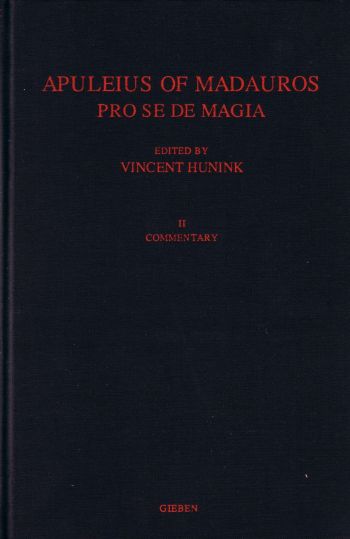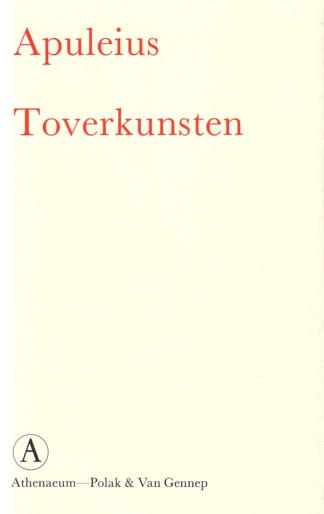|
|
|
edited by Vincent Hunink I text / II commentary Apuleius of
Madauros was not a beginner when he found
himself confronted with a charge of magic,
in the middle of the 2nd century AD. By
then, his reputation as a philosopher and a
public speaker was already well established.
Most likely he had often acted as an
advocate in court, defending the interests
of others. Now, he could fully profit from
this experience. The speech
which Apuleius delivered in defence of
himself, commonly known as the Apology,
is a unique example of Roman oratory,
being one of the very few Latin speeches
from the Imperial Period which have come
down to us completely. In fact, it is the
only judicial speech in Latin from antiquity
after Cicero: the other Roman speeches from
this period, the Panegyricus of
Pliny and the late eulogies known
collectively as the Panegyrici Latini,
all belong to the demonstrative genre of
rhetoric. Already for
this reason, Apuleius' speech is an
interesting document. It is a useful source
for our knowledge in a wide range of areas,
like Roman law, magic, middle Platonism and
contemporary medical science. But there is
more to it: this self-defence may properly
be called a literary masterpiece,
which displays many characteristics of the
Second Sophistic. It is literally crammed
with learned and playful references to
earlier literature and philosophy, and uses
countless rhetorical techniques, not
excluding outright sophisms and distortions,
insults and mean invective. The numerous and
often exotic themes which it deals with, the
brilliant handling of language and the
fascinating erudition of the speaker, all
make this a highly entertaining work of
literature. Nonetheless, the speech has been rather neglected by classical scholars in our century. Scholars who manage to overcome prejudice against the age of Apuleius, with its characteristically `un-Ciceronean' and archaizing tendencies, commonly focus on his famous novel Metamorphoses. Lately, this enigmatic work seems to become even popular as an area of research, something which may also be said for the genre of the ancient novel as a whole. Modern
scholars consult the Apology mainly
for biographic details on the author and his
career or to some specific subject matter.
For example, historians regularly cite from
this speech where it provides bits of
information on the social and economic
circumstances in 2nd century Roman Africa.
It is also regularly used in studies on
ancient magic, another area of increasing
modern interest. Those who study Roman law
and Platonism equally tend to isolate
passages from the speech, if they include it
in their material. Special
studies on the Apology as a whole
are scarce. The ample bibliography included
in the present volume may prove somewhat
misleading. As a matter of fact, only a
small minority of items is devoted to the
speech as a whole, and as something more
than merely a piece of documentary evidence
or a philological puzzle. Though
translations of the Apology continue
to be published in several modern languages
(except, curiously, English), the latest
full commentary on the text, by Butler
and Owen,
dates from before the First World War and
was published in 1914. Considering
all this, time seemed ripe to write a new,
comprehensive commentary on the text as a
work of literature in its own right. That is
what the present volume proposes to do.
Basically, it is not intended to replace
Butler/Owen
(from here: B/O), which is still useful for
many matters of style and grammar, but to supplement
it. The
commentary
attempts to dig into the text where it has
been left closed, to question it where it
is taken for granted, to bring to the
surface its inner structure ─ or,
preferably, its inconsistencies and
self-contradictions. In particular, it
aims at extending the analysis to the
level of the speaker's strategy. So, it
concentrates on the smoke screens Apuleius
raises, on the points which remain vague
and dubious or even seem misleading, and
it tries to follow the speaker's tracks in
the wide field of literature and
philosophy with which he shows himself so
familiar. Of course, the commentary serves
other aims too: explaining difficult words
and phrases, solving philological
problems, providing relevant information
on realia and references to
standard works and scholarly literature.
In particular, from c.66 onward, it also
aims at reconstructing as precisely as
possible events which must lie behind the
text, that is: to tell the tale of what
happened with Apuleius and Pudentilla. The
main aim of the book, however, is to shed
some light on Apuleius as a skilful orator
and as a man of literature. The commentary is preceded by a full Latin text, based on the Teubner edition by Helm, but applying his principles somewhat more `strictly orthodox'. In accordance to the practice followed in the Groningen Commentaries on Apuleius, the text of our main MS, Laurentianus 68,2 (F) has been defended wherever possible, even if this results in unclassical or inconsistent spelling. In this respect the Latin text is traditional and conservative. On the other hand, I also wished to produce a text which is pleasant to read. The typography, the division in paragraphs and the interpunction of the text have all been carefully arranged to serve this aim. Volume I contains the
introduction, Latin text, bibliography and
indexes. Volume II contains the
commentary. Full text as PDF's see further
belown. The research for this edition was my main research project in the period 1994-1997.
Latin text from this edition, made available on-line at the Latin Library Latin
text
from this edition, made available on-line at
the Bibliotheca Augustana Dutch translation (Amsterdam 1992), free ONLINE FULL TEXT (PDF)
Twenty years after its publication as a
book, the full text of the 1997 edition has
been scanned and put online, for free
use by readers and researchers.
Volume 1 (Introduction, Text, Bibliography, Indexes) [16,2 Mb] Volume 2 (Commentary) [29,1 Mb] Please add a proper bibliographical reference if you use any of this material in a new publication.
go to edition with commentary
of the Florida (2001) go to English translation Apuleius, Rhetorical works (2001) go to Index of all items
about Apuleius on this website
latest changes here:
8-8-2017
16:48 |
|


